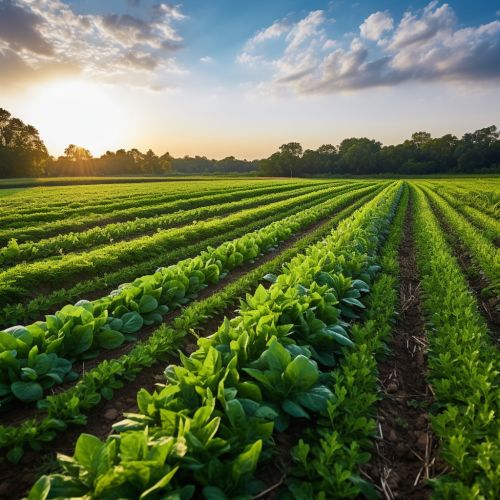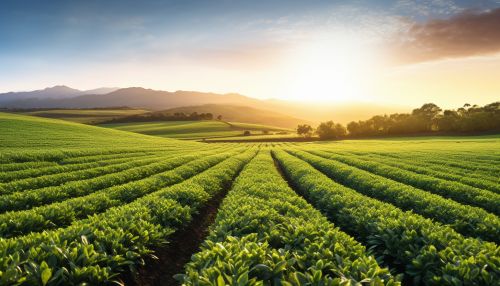Agronomy
Overview
Agronomy is the science and technology of producing and using plants in agriculture for food, fuel, fiber, and land reclamation. Agronomy has come to encompass work in the areas of plant genetics, plant physiology, meteorology, and soil science. It is the application of a combination of sciences like biology, chemistry, economics, ecology, earth science, and genetics. Agronomists of today are involved with many issues, including producing food, creating healthier food, managing the environmental impact of agriculture, and extracting energy from plants. Agronomists often specialize in areas such as crop rotation, irrigation and drainage, plant breeding, plant physiology, soil classification, soil fertility, weed control, and insect and pest control.
History of Agronomy
The history of agronomy dates back to the emergence of agriculture in the Neolithic period. The domestication of plants and animals marked a major shift in human history, as societies moved from hunter-gatherer lifestyles to settled farming communities. The development of agronomy was closely tied to these societal changes, as humans began to selectively breed plants and animals for desirable traits. The science of agronomy as we know it today began to take shape in the 18th and 19th centuries, with the work of scientists such as Justus von Liebig, who is often referred to as the "father of the fertilizer industry" for his work on mineral nutrition of plants.


Agronomy and Crop Science
Agronomy is closely related to crop science, but the two fields have distinct differences. While both fields involve the study of plants and their growth, crop science is more narrowly focused on the cultivation of crops for human and animal consumption. Agronomy, on the other hand, is a broader field that also encompasses the study of soil science, meteorology, and plant genetics. Agronomists work to improve the yield and quality of crops, while also considering the environmental and economic sustainability of farming practices.
Soil Science in Agronomy
Soil science is a key component of agronomy, as the health and composition of soil directly affects the growth and yield of crops. Soil scientists study the physical and chemical properties of soil, as well as its formation, classification, and mapping. They also investigate how different types of soil affect plant growth, and how various soil management practices can improve crop production. This includes the study of soil fertility, or the ability of soil to provide nutrients to plants; soil conservation, which involves preventing soil erosion and maintaining soil health; and soil microbiology, the study of the microorganisms that live in soil and their roles in soil health and fertility.
Agronomy and the Environment
Agronomy also plays a crucial role in addressing environmental issues. Agronomists work to develop farming practices that are sustainable and environmentally friendly. This includes researching and implementing practices that reduce the use of chemical fertilizers and pesticides, improve water efficiency, and promote biodiversity. Agronomists also study the impact of agriculture on climate change, and work to develop strategies to mitigate this impact. This can include practices such as carbon sequestration in soil, which involves capturing and storing carbon dioxide in the soil to reduce greenhouse gas emissions.
Agronomy and Food Security
With the global population expected to reach 9.7 billion by 2050, the role of agronomy in ensuring food security is more important than ever. Agronomists are at the forefront of efforts to increase crop yields and improve the nutritional quality of food, while also ensuring the sustainability of farming practices. This includes the development of new crop varieties that are more resistant to pests, diseases, and extreme weather conditions; the use of precision agriculture technologies to optimize the use of resources; and the promotion of sustainable farming practices that protect the environment and promote biodiversity.
